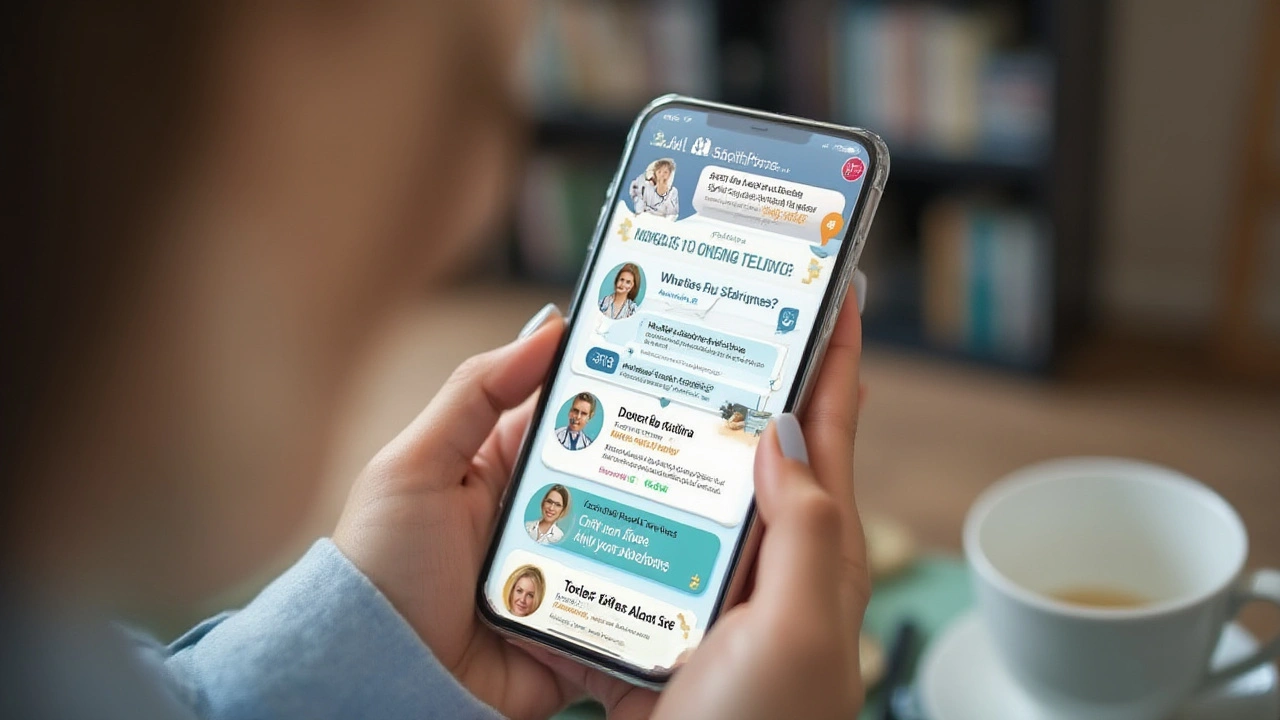Ever opened WebMD at 2 a.m., convinced your runny nose points straight to leukemia? That's not just classic internet anxiety—it's a side effect of relying on websites that turn every itch into a crisis. Here's a secret the internet's slow to give up: a handful of smarter, quieter platforms actually filter research through medical brains before sharing it with you. Today, consumers are outgrowing clickbait symptom checkers. There's a new gold standard—reading where doctors actually read, and finally sidestepping the panic machine.
Why WebMD Isn't Enough Anymore
WebMD has been the household name for quick symptom lookups since the 1990s, but it wears a heavy badge: speed over substance. It’s great for that quick search, but the problem comes when the nuance gets lost. You type in "headache" and, ten clicks later, you’re spiraling into a sea of rare brain diseases.
It's not just the drama, either. WebMD depends on ad revenue, and that shapes what stories and solutions you see at the top. Ever notice how sponsored videos or ads for supplements crowd the sidebar? That’s by design, not by what’s actually best for you. Studies from reputable sources like JAMA have pointed out the risks of relying on ad-heavy health content—it can bias medical decisions and stoke fears about common symptoms.
Doctors have noticed, too. They gripe about patients showing up armed with printouts from websites like WebMD, convinced their minor twinge equals a crisis. The truth? Most doctors consult entirely different, subscription-based databases like UpToDate or DynaMed—platforms awash with clinical guidelines, instead of commercial pop-ups. These platforms are peer-reviewed and meticulously updated. But for years, regular people have been locked out of this kind of trusted content.
Something had to give. Today, clinicians and researchers are stepping up and building consumer platforms designed to bridge the gap between medical journals and normal life. Instead of flooding you with every possible diagnosis, they help you understand research, not just regurgitate it.
How Clinician-Focused Platforms Translate Research
So, what makes these platforms different? The secret sauce is in how they process information. Instead of publishing anything that racks up clicks, they use experts to sift through piles of fresh research, grade its quality, and rewrite it in plain language. The best ones don’t just hand you an answer—they guide you through the "why" behind symptoms, treatments, and prevention.
Platforms like Healthline, Mayo Clinic, and Cleveland Clinic lead this charge. Healthline, for example, boasts a huge medical review board—real physicians double-check every claim before it goes live. When it comes to medical reviews, Cleveland Clinic’s approach stands out: they'll reference studies, acknowledge limitations, and only recommend interventions backed by robust trials. No more relying on anecdotal stories or miracle cures featured in sponsored posts.
This approach actually tackles one of today’s largest healthcare issues: information overload. A team from the Stanford Center for Biomedical Informatics laid this bare in 2023—most consumers struggle to tell real science from editorial opinion online. Authentic clinician-driven platforms list study dates, sample sizes, and outcome relevance, sometimes with easy-to-read tables. That’s the stuff doctors use to make decisions, now in your palm.
| Platform Name | Clinician Reviewers | Update Frequency | Ad-Free? |
|---|---|---|---|
| Healthline | 50+ | Monthly | No |
| Cleveland Clinic | 30+ | Monthly | Yes |
| UpToDate (Consumer version) | Thousands | Continuously | Subscription |
What about the research itself? Unlike typical medical sites, these platforms sort studies by relevance and strength. They’ll break down confusing medical speak, offering analogies, bullet points, and even visuals. For instance: explaining blood sugar in terms of gas for your car—not everyone learns best from numbers. You get the facts (and science) in your language.
Tip: Look for articles where the reviewer’s name and credentials are listed at the top or bottom. If the article is missing a date, move on. Medical guidance that doesn’t show when it was last checked is a big red flag.

Sites Where Doctors Actually Read
If you want to go beyond WebMD, where do you turn? Let’s talk about a few heavy hitters. Mayo Clinic’s website is a perfect example. Their content is carved out by clinical teams, then simplified for the rest of us. They strip out the filler and leave you with actionable advice, and each section usually includes exact references and study data. That’s no accident—it’s built for trust.
Healthline, mentioned earlier, is another favorite among professionals who want their patients informed, not panicked. Its vast medical network vettes every single piece, and refreshing honesty shines through. If a study is small or early-stage, you’ll see it flagged that way. No miracles, just measured possibilities.
Maybe you’re looking for something a bit deeper. DynaMed offers a lay-person platform—think of it as the condensed, trusted encyclopedia your doctor's office wishes you knew existed. While UpToDate is costly for individuals, some local libraries and health systems let you access it for free. Ask your local library if they offer patient portal access; you’ll find the content still delivered with the same clinical rigor, minus the jargon.
But let’s not forget new contenders rising in 2025. Some startups focus purely on giving you doctor-reviewed breakdowns of new studies. Take MedPage Today’s consumer arms: they dissect breaking medical news as it unfolds, clearly stating when a new treatment is actually ready for the masses (or just media hype). These projects are growing because people are finally demanding truth over tabloid headlines.
If you’re hunting for an easy list of resources, a roundup on what's actually better than WebMD runs through platforms with rigorous medical oversight, explaining how each compares in terms of reviewer network, ad policy, and trust signals. It’s worth bookmarking.
- Tip: Don’t judge a site by its polish alone. Even the best-looking websites might lack clinical backing. Double-check reviewer credentials and explicit references before trusting advice.
- Try demoing a few platforms with a minor health question—see whether the explanations make sense, or just serve up generic reassurances.
- The best ones won’t claim certainty when there isn’t any. Science thrives on transparency, not absolutes.
Here’s a curious fact: According to a 2024 survey by Pew Research, less than 20% of Americans say they actually trust symptom checkers. But trust jumps to almost 60% when readers know a doctor reviewed the material. People are catching on that credentials really do matter.
Tips for Finding and Using the Best Clinician-Reviewed Health Resources
You’re probably wondering—how can I make sure I’m reading what my own doctor would trust? Here’s the roadmap.
- Always search for timestamps—health research changes fast. If an article hasn’t been reviewed or updated in the past year, skip it.
- Find proof of reviewer involvement. Reputable sites will stamp their content as "Reviewed by Dr. X" or "Medically reviewed by our team" with names and titles attached.
- Aim for sites that reference primary research—look for links back to journals or at least plain-language citations.
- Beware of "miracle cures" or secret remedies. These posts usually lack references or named experts and often pop up on ad-heavy pages.
- Use critical thinking. If reading a site ramps up your anxiety or pushes expensive supplements before sharing basic facts, step away.
- Bookmark or subscribe to a small handful of trusted platforms—trust builds when you know the standards are high every time you visit.
One more myth worth busting: No credible health platform can (or should) replace your doctor for diagnosis. Use these sources to prep for appointments or understand a condition—not to self-prescribe or skip out on care. The best sites will remind you of this, too, in plain sight.
Worried that finding up-to-date advice from a doctor will cost a fortune? There are free and low-cost options out there, especially if you’re willing to check university hospital sites or tap local library services. And remember: clinicians actually use these same resources every day, behind the curtain.
You don’t have to settle for outdated, ad-riddled advice—put trusted expertise right in your pocket and quiet that 2 a.m. panic, permanently. Welcome to the age of truly informed health choices, no medical degree required.








11 Comments
Tom Druyts
July 19, 2025 AT 20:33This is a really valuable post! I've always felt that WebMD tends to scare people unnecessarily with worst-case scenarios. Having clinician-approved platforms means we can actually trust the info without second-guessing whether the site's sensationalizing symptoms or conditions.
One thing I appreciate about these better platforms is how they explain medical jargon in everyday language without being condescending. It's empowering for folks who want to understand their health better without feeling overwhelmed.
Does anyone have personal recommendations for such sites? I'd love to compile a list to share with friends and family who feel lost in the endless sea of confusing health info online.
Julia C
July 20, 2025 AT 10:26Honestly, I'm skeptical. Most of these clinician-approved sites just repurpose the same cookie-cutter info. And not to mention, a lot of them are funded or influenced by pharmaceutical companies, so can we really trust them to be unbiased?
It seems like no matter what platform you use, there's always some underlying agenda. It’s exhausting trying to figure out what's genuinely helpful versus what’s just marketing disguised as health advice.
And don’t get me started on grammar and spelling errors in supposedly professional articles. Precise language matters, or else it just comes off as lazy and untrustworthy.
Nathan Squire
July 21, 2025 AT 14:13Ah, the eternal conflict between trust and skepticism! As someone who’s been in healthcare, I get why many are wary. However, clinician-driven platforms that are transparent about their affiliations and editorial processes generally produce far more reliable info than generic health sites.
One should always cross-reference and keep critical thinking engaged, but these platforms often provide references to studies and guidelines, which is a huge plus. It interrupts the game of telephone that WebMD sometimes plays with simplified or sensationalized content.
For instance, sites like UpToDate or Mayo Clinic strike a good balance between accuracy and readability.
Riley Fox
July 22, 2025 AT 04:06Okay, hear me out: punctuation is everything when it comes to conveying trustworthiness in medical info. The way a platform uses commas, semicolons, and—yes—even colons can make or break the user's confidence!
WebMD’s dodgy punctuation sometimes makes it harder to trust their articles because it feels rushed or unprofessional. If these clinician-approved sites step up their grammar game, I’d be more inclined to use them.
Though, of course, substance triumphs form, but why not have both, right? Seriously, language is the backbone of clear communication, especially for health-related topics where misinterpretation can cost lives. :P
Brooke Bevins
July 23, 2025 AT 21:46I totally agree with the need for trustworthy health info that’s also easy to understand. Sometimes, when people get vague or alarmist information, they panic unnecessarily or ignore symptoms altogether.
Platforms that are vetted by healthcare professionals provide real reassurance, which is so important when it involves health decisions. Emojis aside, emotional clarity in communication fosters better mental health too, so I love seeing these newer sites strive for empathy in their tone.
It’d be great if these sites also included forums moderated by clinicians, so folks can ask questions and get reliable feedback instead of endless anecdotal opinions.
Darin Borisov
July 24, 2025 AT 11:40It is paramount, within the context of medical epistemology, that one delineates between mere anecdotal or commercial narratives and rigorously examined biomedical data when approaching health information.
The proliferation of clinician-endorsed platforms represents a commendable shift towards epistemic integrity, wherein health communicators employ lexicons that balance scientific precision with accessibility.
However, the distillation of intricate pathophysiological concepts into quotidian vernacular must be executed with unimpeachable scholarly rigor to mitigate any propagation of misinformation or diminution of the data's nuance.
Consequently, scholars and practitioners alike have a responsibility to maintain dialogic transparency and incorporate continual peer review within these digital repositories of knowledge.
Sean Kemmis
July 25, 2025 AT 01:33Honestly, all these so-called 'clinician-approved' sites just end up sounding like sanitized PR material. Call me cynical, but it’s like they’re afraid to say anything remotely controversial or might ruffle a pharmaceutical sponsor’s feathers.
Sure, they’re better than WebMD in some ways, but do they really make any significant breakthroughs in quality? I doubt anyone’s gonna solve the problem of internet health misinformation unless people start questioning everything a little more.
Most readers still want simple answers and often settle for the first source they find, which is a problem bigger than just the platforms.
satish kumar
July 25, 2025 AT 15:26The emphasis on 'clinician-approved' infers credibility, which is laudable, yet frequently, these claims stand as mere marketing tactics devoid of substantive peer-review mechanisms.
Without rigorous regulatory frameworks applied to online health information dissemination, user discernment remains the only safeguard.
While these platforms ostensibly endeavor to supersede WebMD's sensationalism, vigilance and skepticism are prerequisites for navigating digital medical advice prudently.
Vikas Kale
July 26, 2025 AT 05:20I have noticed that many reputable platforms incorporate the latest clinical guidelines and research references plus graphical illustrations to enhance comprehension. It’s astonishing how much clarity a well-placed diagram or video can provide versus text alone.
Hence, moving beyond simple text-based info is critical. Interactive tools with symptom checkers, disease progression animations, and expert Q&A sessions bring a rich educational experience.
Of course, users must still exercise judgment, yet these advancements bridge gaps between patients and healthcare providers.
Matthew Marshall
July 26, 2025 AT 19:13WebMD is SO overrated. It’s like the ultimate hyped drama queen of health sites, constantly blowing things out of proportion or leaving you hanging with vague answers. Clinician-approved sites? Now that’s actually worth paying attention to.
These platforms keep it straightforward without trying to scare the living daylights out of you or throw every rare symptom at you like you have some terminal mystery illness. It’s like a breath of fresh air.
John Blas
July 27, 2025 AT 09:06From a purely observational standpoint, it is clear that the medical information ecosystem online is saturated with redundancy and misinformation alike, and clinician-approved platforms offer a glimmer of hope amid this chaos.
However, the mere approval by clinicians does not inherently guarantee quality; the regularity of updates and explicit disclosure of sources remain critical factors. The effectiveness of these platforms lies in the consistent validation and transparent methodology behind their content.